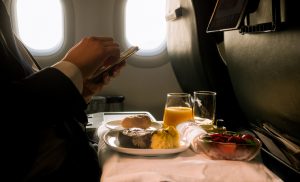Business travel involving long-haul flights and jet lag can throw our metabolism into disarray. Travel over multiple times zones can play havoc with digestion. Understanding the causes of this suffering may help us avoid tummy troubles interfering with our business agenda.
Eat When Our Body is Expecting Food
 Our body is a creature of habit. Hormonal rhythms are dictated by our day/night cycle which becomes confused with changes in time zones. Food is best digested when our body is expecting a meal.
Our body is a creature of habit. Hormonal rhythms are dictated by our day/night cycle which becomes confused with changes in time zones. Food is best digested when our body is expecting a meal.
Unfortunately, business travel through multiple time zones can result in our physiology being in night-time mode and our digestive system effectively asleep, but we could be having a business meeting over lunch or dinner. A sluggish metabolism can make an uncomfortable protest.
What Can We Do?
Try to plan business meals when our body is expecting food. It doesn’t matter if our body is expecting breakfast and we give it dinner – or the other way around. Indigestion is best avoided by eating when our digestion is ready and waiting.
If this isn’t possible, then small amounts of light food are the best option. Light snacks, salads, sushi, fruit and vegetables are good. Avoid anything deep fried or greasy, this will be a tough task for a compromised digestive system.
What About Flying Long Haul?

The same rule applies. When travelling long distances for short periods of time, it helps to keep our metabolism in the home time zone. Long haul flights often involve meals being served when we aren’t hungry.
Rather than eat a large meal at 2 am, it’s better to sleep and eat when we wake, which could involve bringing our own food. If travel for business is at the front of the plane, then it may be possible to choose when a meal is served.
Bunged Up Bowels
Constipation can be an unwelcome hazard when travelling for business. A hurried schedule, snatched snacks, hours stuck in a seat, can rapidly lead to bunged up bowls.
Fibre, Fluid and Fitness
The three F words to help us avoid constipation.
Fibre: we’re meant to eat 30g per day – but few of us do even when at home. We need to choose foods high in fibre and if necessary, carry high fibre snacks with us.

100g of avocado has 7g
100g of baked beans has 6 g
An apple has 2g
50g bag of dried fruits has 4g
50g bag dried fruit and nuts have 3.6g
Fluid: dehydration is common when travelling and is a major cause of constipation. An arid aeroplane atmosphere, lack of access to drinks or holding back on fluids when we aren’t certain where the next toilet will be, can all lead to bunged up bowels.
All fluid is useful. Carrying our own water supply is the gold standard, but keeping up consumption of all beverages is important – apart from those strongly caffeinated or high in alcohol.
Fitness: Going from sedentary travel to a sedentary work environment can make our bowels static. Physical activity is important to prevent sluggish bowels. Walking around the airport terminal and getting a walk/jog or gym session at our destination is a great way to keep bowl contents moving.
Probiotics
The research is ongoing, but gives little hard evidence to the effectiveness of probiotics, except to say that some products work for some people. A variety of Digestive Support Travel capsules are available, they do no harm and can be effective when our microbiome is disturbed by the rigours of travel.
© Extravitality 2018
Thinking of taking good sources of fibre with you? Try these carry-on packs.
by - [-]
Price: -
by - [-]
Price: -
by - [-]
Price: -
by - [-]
Price: -





























